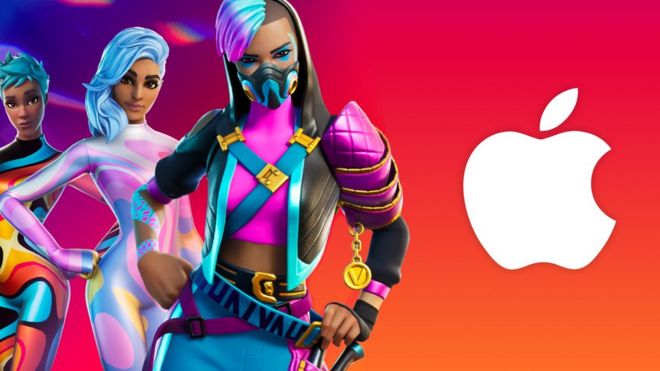Fortnite: Apple ban sparks court action from Epic Games

Apple has removed Fortnite from its App Store, preventing players from installing one of the world's most popular games on iPhones.
It came after a Fortnite update that let players buy in-game currency at a lower rate if they bought direct from maker Epic Games - bypassing Apple.
Epic appeared to know the ban would come, announcing it had filed a legal complaint minutes after the removal.
Apple takes a standard 30% cut of sales from its compulsory payment system.
Hours later, Google also appeared to remove the app from its Google Play Store - though it remains available on Android phones through other means, such as Epic Games' own launcher.
 EPIC GAMES
EPIC GAMESOn iOS, the App Store is the only way to legitimately load apps. But Apple said Epic had taken the "unfortunate step of violating the App Store guidelines".
Those guidelines ban any payment system apart from Apple's own, and has been the subject of several high-profile rows between developers and Apple.
Epic said any iPhone players who already have the app installed should be able to continue playing until the game's next update rolls out. After that, they will lose some features.
Those on an Apple Mac computer will not be affected, since that version does not use the iOS App Store.
In addition to tweeting the legal complaint it filed in a California court, Epic also announced the imminent in-game screening of a short film titled Nineteen Eighty-Fortnite - a play on George Orwell's novel Nineteen Eighty-Four.
The novel is about a dystopian society that controls its citizens and tolerates no dissent - and was itself referenced by Apple in a famous television ad in the year 1984, when the young company styled itself as taking on then-dominant IBM.
Epic Games directly referenced that advertisement in its legal complaint, writing: "Apple has become what it once railed against: the behemoth seeking to control markets, block competition, and stifle innovation."
The court documents allege that Apple effectively runs a monopoly in both deciding what apps can appear on iPhones and demanding its own payment system - with the relatively high 30% cut - is used.
Piers Harding-Rolls, games research director at Ampere Analysis, said Epic's update breaking the rules "was done to make Apple remove the app".
"Removing Fortnite from the App Store helps to deliver a groundswell of support for Epic, something it is trying to achieve."
And he added that iPhones are not the biggest platform for Fortnite, but Epic will still notice its ban - the iOS version "generates tens of millions of dollars in revenue every month on Apple platforms", he said.
Developers really, really don't like this charge. For many, a 30% cut of profits is akin to a shakedown.
Last month, one app developer likened Apple to the mafia. The criticism is essentially an anti-competition one.
Apple and Google run the operating systems of pretty much all of the phones in the world. That means they get to choose who can run apps on their stores, and who can't.
They also get to set the charges. This is duopoly, say some developers.
In Epic Games though, Apple has an unwanted foe.
Fortnite is ludicrously profitable, Epic Games has the money to take Apple on. And the way this has been done - passing the savings on the consumer - is clearly tactical. Epic Games wants to take this fight out into the open.
And with the EU and US Congress looking closely at Apple's business practices, this is attention the company could do without.

In its court filing, Epic said it was not seeking financial compensation.
"Epic is seeking injunctive relief to allow fair competition in these two key markets that directly affect hundreds of millions of consumers and tens of thousands, if not more, of third-party app developers," it said.
The documents also hint at a possible larger goal.

"But for Apple's illegal restraints, Epic would provide a competing app store on iOS devices," it says.
Epic Games has already attempted to disrupt the PC gaming market with the launch of its Epic Games Store, taking on the dominant player, Steam, in an attempt to lure players away with free games, which have often been popular, top-rated titles.
Piers Harding-Rolls said the row is reminiscent of that challenge - Epic's store charges game developers 12% on PC games, compared to Steam's 30%.
"Apple and Google have been a long term target of Epic CEO Tim Sweeney's ire, as he believes the 30% revenue share they charge for app sales and in-game monetisation is too high," he said.
"However, taking on Apple is a different challenge than in the PC market as it's impossible to build a third-party storefront on iOS, or monetise apps outside of the App Store."
Google's Android system also uses Google's payment system for app store purchases, from which Google takes a cut - but Android allows developers to point users to other payment options.
In a statement, Apple said the rules were applied equally to every developer, and that Epic had updated their game "with the express intent of violating the App Store guidelines".
"Epic has had apps on the App Store for a decade, and have benefited from the App Store ecosystem," it said.
"The fact that their business interests now lead them to push for a special arrangement does not change the fact that these guidelines create a level playing field for all developers and make the store safe for all users."
It added that it would try to work with Epic to bring Fortnite back.








Comments